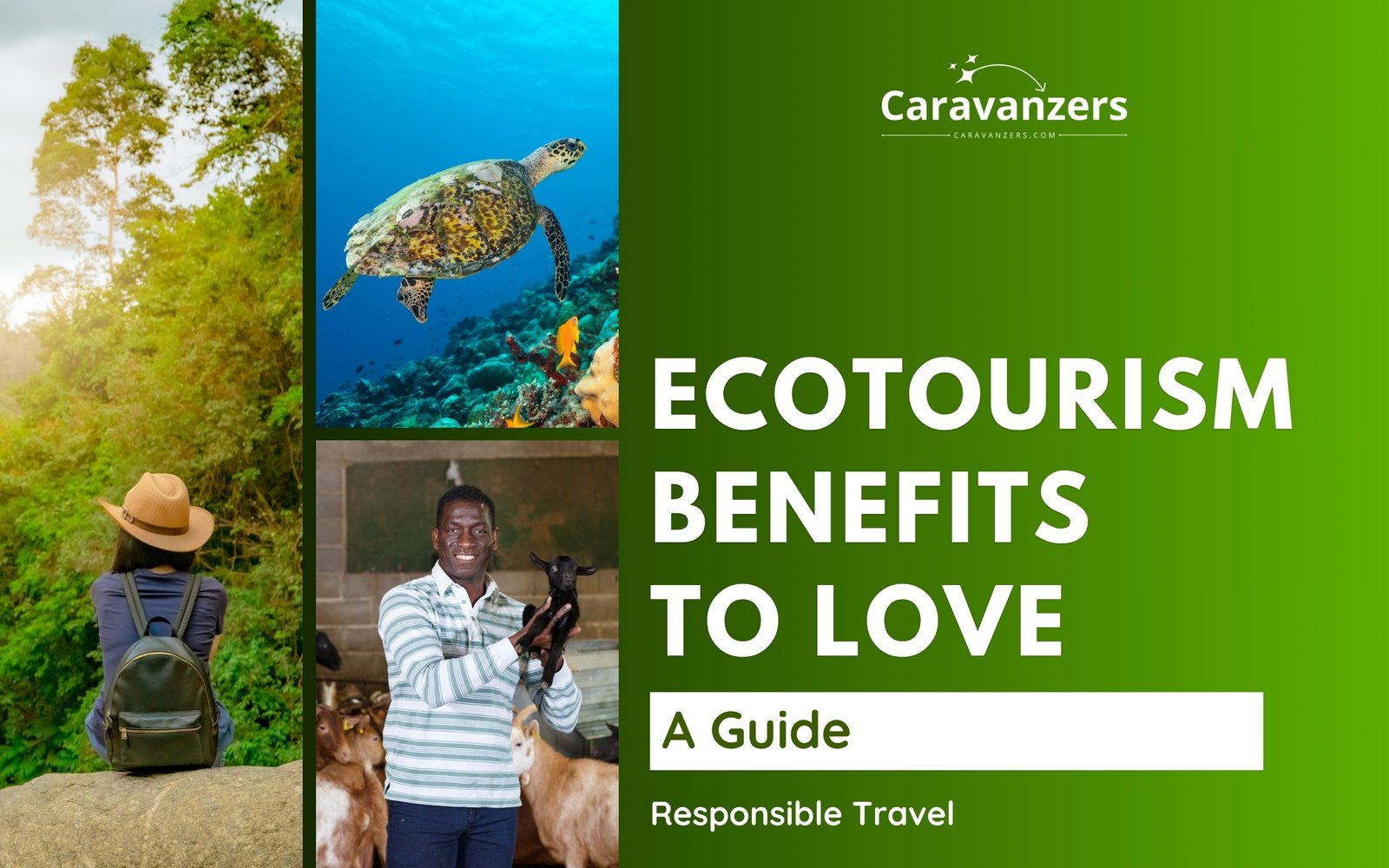
Ecotourism benefits stem from the intentional collaboration of travelers and stakeholders. Use this guide to help.
Like many aspects of travel, ecotourism is complicated. On the one hand, travelers appreciate knowing they are making a difference.
On the other hand, though, some travelers feel ecotourism restricts their trip, or how they enjoy their travel.
In this guide, I will show you how ecotourism makes a huge impact and your small habits can go a long way. And, without sacrificing fun trips!
Keep reading.
Benefits of Ecotourism

Ecotourism benefits include economic advantages for local communities, generating income and supporting conservation efforts.
It also about raising environmental awareness and providing educational opportunities, cultivating sustainable practices.
Likewise, the industry promotes cultural exchange that strengthen respect for local traditions.
Meanwhile, ecotourism also encourages participation in conservation activities and supports natural resource management.
That is, this is a way to create mutually beneficial experiences, benefiting both tourists and host communities while contributing to environmental and cultural preservation.
Benefits for Local Communities
Provides a significant source of income, boosting local economies.
Economic benefits for local communities through ecotourism are very helpful. These include providing sustainable income opportunities, supporting local businesses, and promoting job creation in tourism-related sectors.
Popular sectors that consistently provide ecotourism benefits include hospitality, guiding, and handicrafts. These financial inflows contribute to local economies, helping to improve infrastructure and social services.
Everyday travelers may participate by staying in locally owned accommodations, buying locally made goods, and engaging in guided tours led by local experts.
In the meantime, travelers should avoid practices that drain resources or exploit locals. These include undervaluing services or engaging in mass tourism that harms the environment.
Of course, responsible spending and supporting community-run initiatives help support long-term benefits.
Environmental Education
Raises awareness about environmental issues and promotes sustainable practices.
Environmental education is one of the most important ecotourism benefits. This entails teaching visitors about local ecosystems, conservation efforts, and sustainable practices.
Education is very important because it cultivates awareness about the environmental challenges that regions face and the importance of protecting natural resources.
So, travelers may participate by engaging in eco-friendly activities, such as guided nature walks or educational programs. These all provide insight into local biodiversity and conservation projects.
Also, follow responsible practices, like reducing waste and conserving water. It may sound small, but this is really huge!
Meanwhile, please consdier to support environmental education as we should avoid behaviors that harm the environment.
Some of the most harmful behaviors include littering, disturbing wildlife, or contributing to overconsumption of natural resources in fragile ecosystems.
Conservation Ecotourism Benefits
Generates funding for conservation efforts, helping preserve ecosystems.
Financial benefits for conservation are the funds generated through ecotourism. These could be individual, community, or even national donations, for instance.
Such financials provide ecotourism benefits because they directly support the protection and preservation of natural habitats and wildlife.
Of course, entrance fees to national parks, donations, and sustainable tourism revenue help finance conservation initiatives. These make sure that ecosystems remain protected for future generations.
That means when you visit the Great Wall of China, part of your fees will go toward helping the entire place clean.
Meanwhile, travelers can contribute by visiting protected areas, purchasing eco-tours, and supporting local conservation programs.
Participating in activities that fund wildlife protection and habitat restoration also helps.
That said, travelers should avoid participating in exploitative tourism that does not support conservation efforts or contributes to environmental degradation. Think of activities that harm wildlife or disturb fragile ecosystems.
Strengthening Cultural Understanding

Promotes respect for and understanding of local cultures and traditions.
Strengthening cultural understanding is about nurturing mutual respect and appreciation. These appreciations may be for the local traditions, customs, and ways of life.
For example, did you know that taking an Ethiopian food class with some organized trips help local families?
This is part of the overall ecotourism benefits because it provides an opportunity for visitors to learn about and connect with indigenous and local cultures. It promotes cross-cultural exchange.
Of course, travelers may participate by engaging respectfully with local communities, learning about their traditions, and supporting cultural heritage. You may do this through authentic experiences, such as visiting local markets or attending cultural performances.
However, travelers really should avoid behaviors that are disrespectful or intrusive. Think of things such as taking photographs without permission, trivializing cultural practices, or imposing their own cultural norms on local communities.
Respect and sensitivity are key.
Natural Resource Management
Encourages sustainable management of natural resources and ecosystems.
Support for natural resource management is the efforts aimed at conserving and sustainably managing. Think of the ecosystems, wildlife, and natural resources.
For instance, your Indian travel visa will support projects the government uses to offset your travel, including environmental programs.
Ecotourism benefits in this area plays a vital role by funding and promoting initiatives like habitat restoration, wildlife protection, and sustainable land use practices.
Travelers may contribute by visiting conservation-focused sites, participating in eco-friendly tours, and supporting businesses that prioritize sustainability.
Also, donate to local conservation projects or volunteer in preservation activities.
Of course, travelers should avoid actions that harm ecosystems. Think of things like littering, disturbing wildlife, or engaging in activities that deplete or damage natural resources.
Top Ecotourism Projects
Projects around the world that are currently supporting ecotourism.
Ecotourism benefits work because there are individuals and organizations pushing them. of course, not all organizations are created equal.
So, top ecotourism projects focus on preserving ecosystems while offering sustainable travel opportunities.
Notable organizations include The Rainforest Alliance, which certifies eco-friendly businesses, and WWF’s Wildlife Programme, which supports wildlife conservation through responsible tourism.
Projects like The Galápagos National Park and Costa Rica’s Tortuguero National Park promote biodiversity and sustainable tourism.
Travelers may support these efforts by working with them directly. For instance, booking tours with certified operators, staying in eco-lodges, and participating in conservation activities.
Of course, you should avoid harmful practices. Avoid things like supporting wildlife exploitation, leaving waste behind, or participating in mass tourism that damages fragile ecosystems.
Respect for nature and local cultures is essential.
Ecotourism Benefits to Adopt
Small habits can have a huge impact on ecotourism.
Before your trip, research destinations that support sustainability and choose eco-friendly accommodations and tour operators.
You may also educate yourself about local cultures, wildlife, and conservation efforts to ensure respectful behavior.
During the trip, you should follow eco-friendly practices. Popular practices include reducing waste, using reusable items, respecting wildlife, and adhering to local regulations.
Meanwhile, know that participating in conservation activities or supporting local businesses helps boost the local economy.
After the trip, you can share their experiences to inspire others, donate to conservation organizations, or continue supporting sustainable practices in your everyday life.
This will definitely promote responsible tourism for future generations.
Final Thoughts
Ecotourism benefits include supporting local economies, promoting environmental conservation, strengthening cultural understanding, and nurturing sustainable travel practices.
Of course, travelers shouldn’t be afraid of ecotourism. It doesn’t compromise fun; it offers unique, immersive experiences.
Ecotourism means a chance to participate in wildlife watching, cultural exchanges, and outdoor adventures.
And, all while prioritizing sustainability and conservation.
So, go ahead and enjoy your trip!
AJ Paris is a travel photographer based in New York. He is the editor of Caravanzers.
Follow us on Pinterest.
